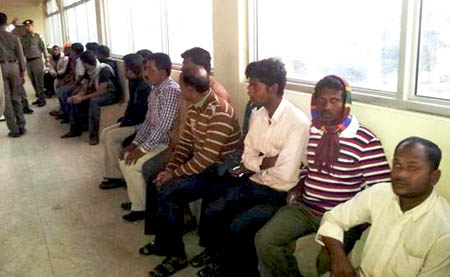 Dammam, Mar 9: Col. Ziyad Al-Ruqaiti, spokesman for Eastern Province police, said 32,015 expatriates have been arrested in the province’s various cities, governorates and villages for violation of residency and labor law since the launch of the inspections campaign.
Dammam, Mar 9: Col. Ziyad Al-Ruqaiti, spokesman for Eastern Province police, said 32,015 expatriates have been arrested in the province’s various cities, governorates and villages for violation of residency and labor law since the launch of the inspections campaign.
He said the arrested persons have been handed over to the directorate and branches dealing with illegal expatriates affiliated with the Eastern Province. He said the participating authorities include the passport and labor offices.
Law enforcement authorities are continuing with their efforts to arrest expatriates in violation of the rules through intensive field campaigns and raids that are targeted at locations harboring violators. Special teams conduct field campaigns and raids acting on information about the existence of illegal expatriates in certain locations.
Al-Ruqaiti warned citizens and residents against harboring law violators, or hesitating to report any violations. He added that security campaigns will continue until the phenomenon of violation is eliminated.
Mohammad Al-Faleh, director general of the Ministry of Labor in the Eastern Province, said that the total number of arrested violators since the start of the follow-up campaign reached 1,586 violators in the Eastern Province. Those arrested have been handed to the directorates and branches of expatriate detention centers of Eastern Province police.
He said 851 people were in violation of Article 39, which concerns working for people other than the sponsor; 60 were in violation of Article 38, which is concerned with working in professions that are not specified in the passport, and 675 in violation of Article 25, which has to do with fictitious employment.
Al-Faleh’s remarks came after a number of officers and administrative officials were honored for their outstanding performance in the labor correction campaigns launched by the Ministries of Labor and Interior.
Prince Saud bin Naif, governor of Eastern Province, his deputy Prince Jalawi bin Abdulaziz and the minister of labor issued directives to form a higher security committee under the presidency of Khaled Al-Battal, the province’s secretary-general. The committee will meet once a month to overcome any obstacle in the way of correcting labor market anomalies.





Comments
Add new comment